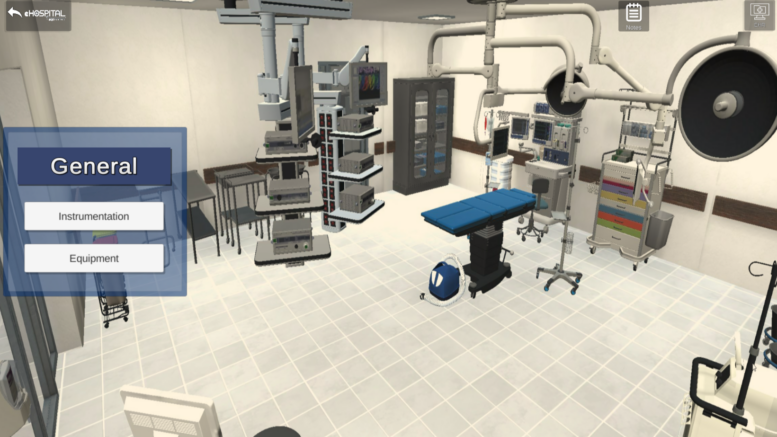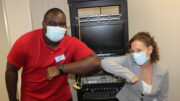ECPI University Introduces eHospital
By Dr. Erica Jones-Foster, ECPI University Director of Educational Technology and Innovation
ECPI University is pleased to announce eHospital, a proprietary software program that is designed to deeply enhance its students’ educational experience. The eHospital is a healthcare simulation platform that allows students to practice clinical skills. The principle goals of the eHospital are to ensure students are exposed to the medical environment, prepared for clinicals, and prepared for careers in the healthcare industry. Indeed, it is one of a kind. Each virtual environment was created by subject matter experts in the nursing and health sciences fields, alongside the ECPI University Educational Technologies Development Team, to help ensure ECPI University graduates are proficient and ready to become leaders in the healthcare profession. The ECPI University eHospital houses six virtual environments which include: Triage, Patient Room, Medical Laboratory, Education Center, Operating and Emergency Rooms.
Triage and Patient Room
Within the Triage and Patient Room environments, students practice basic clinical skills such as, measuring height, weight, respiration, blood pressure, oxygen saturation, and pulse. Each of the simulations correspond to current certifications and curriculum that is being taught in the classroom. In addition to basic clinical skills, students practice advance medical procedures such as ECG/EKG and calculating the dosages of intravenous medications. The ECG/EKG simulation walks students through the proper placement of electrodes, leads and identification of rhythm strips. Students practice dosage calculations using the fully-interactive IV pump. They calculate the appropriate dosage, input the information into the virtual IV pump, and observe the rate at which the medication flows through the pump. These simulations have been especially helpful in improving student engagement in the remote classroom.
Medical Laboratory
The Medical Laboratory environment was created using the National Health Career Association guidelines. It provides Medical Assisting students a platform to practice reading lab orders and determining the appropriate order of draw. In addition to the Medical Laboratory, the eHospital contains seven Operating Rooms that introduce students to the proper setup of equipment and instrumentation. The Operating Rooms include: General, OB/GYN, Plastic, Ophthalmic, ENT, Neuro and Ortho. Within each room, students identify and categorize instruments. Ultimately, they gain insight into basic surgical procedures and an understanding of the different types of equipment and instruments needed to perform specific surgical procedures.
Education Center
Within the Education Center environment, 12 fully-interactive body systems are readily available for review. Available systems include: Integumentary, Lymphatic/Immune, Skeletal, Muscular, Endocrine, Cardiovascular, Respiratory, The Senses, Digestive, Urinary, Reproductive and Nervous Systems. Each system is fully annotated and adapted to suit every learning style. Study tools that allow for annotation, tagging, virtual dissections and quizzing have been added to enhance learning experiences. In addition to body systems, over 50 different 3D pathology models are present within the Education Center. The models give students a real-world perspective on the role pathogens play on human diseases. Furthermore, a game named ‘Bones in the Box’ is available. It gives students the opportunity to test their knowledge of the skeletal system in a gaming environment.
Helicopter and Ambulance
A fully functional 3D helicopter and ambulance were created to enhance student engagement and enrich the Emergency Medical Technician program. The creation of the models gives students the opportunity to experience the intricacies of patient care in the confines of a small and authentic space. Within the ambulance and helicopter students will practice basic life support techniques and learn the necessary soft skills required for proper patient care. Students will be highly prepared and confident to tackle any situation that may arise within the medical field.
Coming Soon!
To remain among the best and innovative universities, additional models and simulations are being developed that provide students with added advanced clinical skills. The simulations include suturing, applying casts, interactive female birthing model, neonatal care, pediatric care, gerontology, pharmacology, tracheotomy, ostomy procedures, wound care, and head-to-toe assessments. Overall, each simulation is designed to enhance the learning experiences of students to ensure graduates of the ECPI University College of Health Sciences are prepared to tackle any obstacles they may encounter as a leader in the health care industry.











Be the first to comment on "At Forefront of Student Engagement and Innovation"